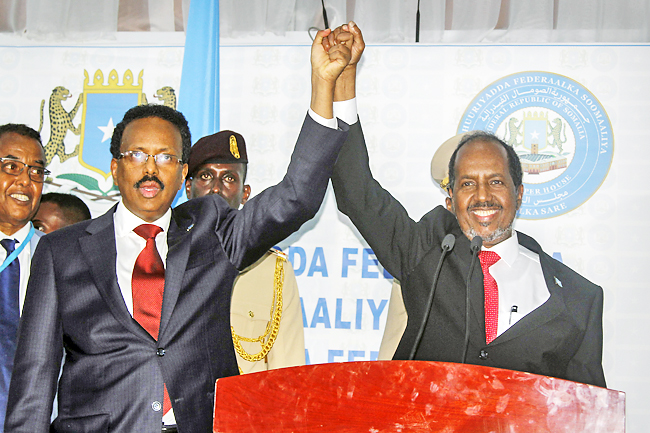MOGADISHU (AFP) – Somalia’s international partners yesterday welcomed the election of President Hassan Sheikh Mohamud, who takes office after months of political instability and faces crises including a violent insurgency and devastating drought.
Residents in the capital Mogadishu raced through the streets banging metal cans and fired guns into the air in celebration as the result of the marathon poll was announced around midnight.
Many hope the vote – which concluded peacefully but was dogged by claims of irregularities – will draw a line under a political crisis that has lasted well over a year.
Outgoing president Mohamed Abdullahi Mohamed’s term ended in February 2021 without an election and the protracted tussle for power that followed turned violent at times and caused divisions at the highest levels of government.
Somalia’s international partners had repeatedly warned the election delays were a dangerous distraction from the fight against Al-Shabaab insurgents, who have been trying to overthrow the government for over a decade.
Yesterday, the United Kingdom’s (UK) Minister for Africa congratulated Mohamud, who ruled Somalia between 2012 and 2017, and is the first president to win a second term in the troubled Horn of Africa nation.
The UK “looks forward to continuing its close work to support on building stability, tackling Al-Shabaab and supporting those affected by the devastating drought”, Minister Vicky Ford tweeted.

Mohamud has promised to transform Somalia into “a peaceful country that is at peace with
the world”.
The East African regional bloc IGAD said Mohamud’s victory was “a clear testimony of the trust and confidence that the people of Somalia have in his leadership qualities”.
Somalia has not held a one-person, one-vote election in 50 years and few of its 15 million people played any part in choosing Mohamud.
Instead, polls follow a complex indirect model, where state legislatures and clan delegates pick lawmakers for the national Parliament, which in turn chooses the president.
Still, in the capital there were celebrations that stretched into the early hours, and some expressed relief that the long-running election saga was over.
“This country seriously needed leadership change to avoid bloodshed… that’s why this election was so important,” said Habiil Ali, a resident from Mogadishu’s Wadajir district.
A former academic and peace activist, Mohamud’s first election in 2012 raised hopes that Somalia was on the path to stability.
But his administration was dogged by high-profile corruption scandals and political turmoil, with two of his three prime ministerial appointees forced out, and two central bank governors resigning.
“I know the new president has not got the best record,” said Abdinasir Mohamed, another Mogadishu resident. “But we are hoping he changes this time around.”
In addition to tackling a looming famine caused by drought, Mohamud will also need to repair the damage done by months of political infighting, both at the executive level and between the central government and state authorities.
At his swearing-in after midnight on Sunday, he hailed his predecessor for enabling a peaceful transfer of power. “We must move forward and never backwards. We have to heal any grievances,” he said.






